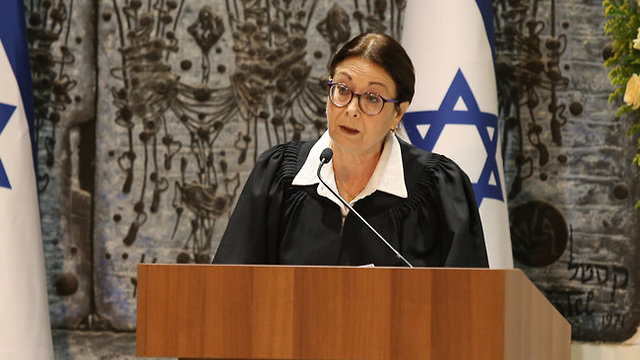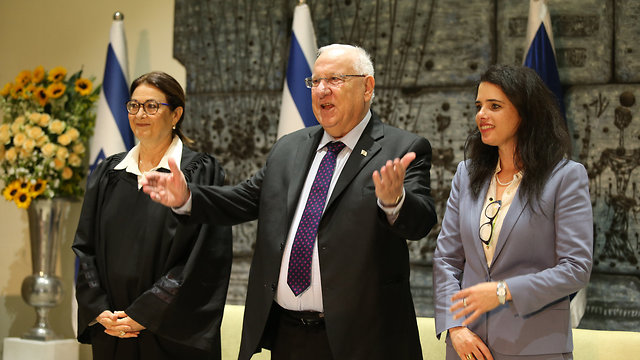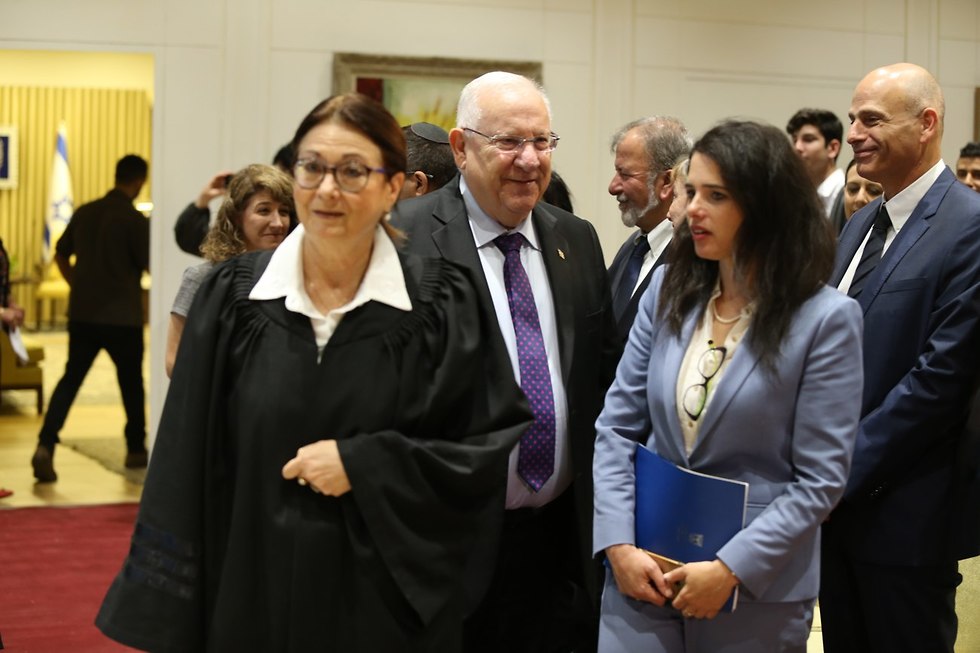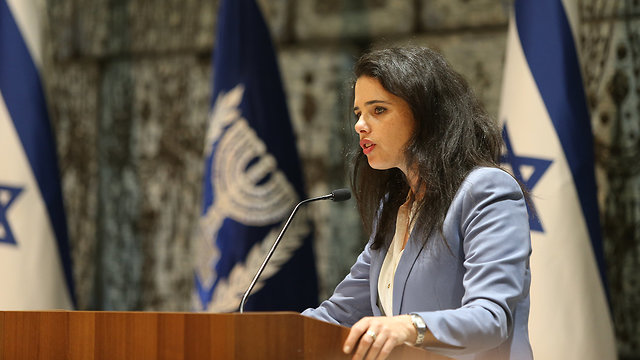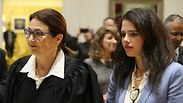
Chief Justice Hayut: Override power a 'bad, dangerous' proposal
Following override power's approval by Ministerial Legislation Committee, Chief Justice Hayut says judiciary under 'blunt, unprecedented attack'; Justice Minister Shaked: 'Israeli democracy stronger than all of its eulogizers'; President Rivlin: 'In absence of defense of minority rights, ruling majority nothing more than domineering.'
Speaking on the matter first, Supreme Court Chief Justice Esther Hayut said that the issue should be "removed from the public agenda," adding that she thought the judiciary was under a "blunt, unprecedented attack that seriously threatens its independence and impartiality."
Speaking later, Justice Minister Ayelet Shaked quoted former supreme court justice Moshe Landau, who said, "As it pertains to reciprocal relations between the Knesset and the judiciary, the country has reached a crossroads. This impediment must now return to the Knesset." "We have begun the process of doing just that (Sunday), more than 20 years later," Shaked added, "a process that will restore the public's trust in the court."
Continuing her prior speech, Hayut stated that, "One of the more worrying expressions of this attack (on the judiciary) is the decision approved Sunday by the Ministerial Legislation Committee," Hayut added, referring to approval of the bill in preparation for a Knesset vote likely to take place Wednesday.
The chief justice then attacked the bill's sponsors, who claimed that the government began "constructing the separation wall between the three branches of government."
"Woe be to the country and society that erect separation barriers between its branches. The approach according to which such a barrier is required negates any accepted approach regarding the relations between the three branches," Hayut maintained.
If relations between the powers require any regulation, Hayut claimed, it was certainly not to be done with such "offensive legislation, which offers neither regulation nor balance."
What it does, she offered, was "nullify the meaning of the Basic Law. The cynical use of the migrant problem as a pretext for such a clause cannot dilute its destructive meaning."
Regulating the interrelations between the executive, legislative and judiciary, she stated, was a "complex, fateful issue that should be treated with the proper reverence and while holding a topical, responsible dialogue in order to build rather than destroy."
The meaning of such legislation in its current promulgation, Hayut added, was clear: "Waiving constitutional protections on the human rights anchored in Israel's Basic Law: Human Dignity and Liberty, and allowing full rein to laws infringing upon said rights without the courts being able to offer those harmed succor."
"Anyone who believes the override power 'overrides' the court is sorely mistaken," Hayut elucidated. "Truth be told, it overrides the human rights of every member of Israeli society and makes it legitimate for the Knesset to enact laws infringing on those rights without hindrance."
The very act of enacting an override power, Hayut cautioned, "will besmirch the yet-incomplete Israeli constitutional enterprise, create constitutional chaos and turn constitutional protection into an empty vessel. This is a bad, dangerous and harmful proposal."
Concluding her remarks, Hayut reminded the assembled crowd, which included Justice Minister Shaked, that safeguarding minority rights stood at the heart of Israel's accession to the Organization for Economic Cooperation and Development (OECD).
Shaked: 'Israeli democracy stronger than all of its detractors, eulogizers'
Offering her own comments on the controversy, Justice Minister Shaked said, "About once a week a public appeal is made announcing the State of Israel is dutifully marching towards the end of democracy, sometimes due to a government action and sometimes due to legislation."
"An alien landing here," the minister continued, "may be fooled into believing Israeli democracy is so fragile so as to collapse in an instant. The inflation in pronouncements of Israeli democracy's demise have become absurd, and are a political battering ram more than anything."
"I'm sorry to disappoint all of those delivering eulogies, but go outside and see—Israeli democracy is alive, breathing and stronger than all of its detractors and eulogizers combined."
Rivlin: Majority rule with safeguarding minority rights just 'domineering'
The ceremony, in which ten new judges were sworn in, was opened by President Reuven Rivlin, who said the occasion was special since the majority of judges about to be sworn in were women.Speaking on the override power issue himself, Rivlin said, "The fundamental rules of democracy state that the majority holds sway. There is no contradiction, however, in accepting these rules and stringently defending minority rights."
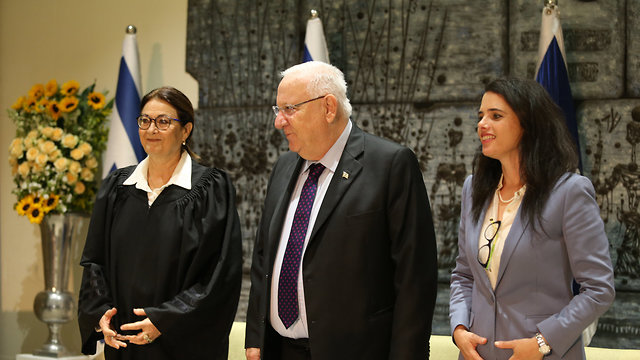
"On the contrary, defending minority rights does not only balance the majority's right to rule, but also manufactures its moral imperative to do so. In the absence of defense of minority rights, the ruling majority is nothing but domineering and ruling by imposition," the president added.
"One of the necessary roles of the judiciary is preserving the delicate balance regarding this matter. As we all know, life is dynamic. The majority can become the minority and vice versa. When it comes to issues pertaining to the basic rules of democracy, consent is better than decision," he concluded.
Speaking at an earlier conference, Shaked claimed that, for years, legislators have been arguing on the amount of MKs it would require to bypass the High Court's rulings, but "everyone agrees such legislature needs to be passed."
An override power, or notwithstanding clause, will allow the Knesset to reenact any law struck down by the High Court with a 61 MK majority.
The clause is expected to be moved through the Knesset, even though Deputy Attorney General Raz Nazri said at the conference that, "The attorney general's position is that all proposals (on the issue) should be opposed.
"We are not saying that it is unconstitutional, because it is an amendment to a Basic Law, but we oppose it."










